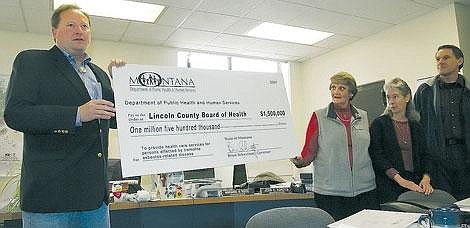County Board of Health gets $1.5 million from state
Gov. Brian Schweitzer was in Libby Wednesday where he presented a $1.5 million check to the Lincoln County Board of Health to help finance treatment for asbestos-related diseases.
The money is only a temporary boost for a long-term medical burden faced by hundreds of sufferers of asbestos related disease and their tireless physicians, who must, at times, balance care giving with grant writing.
The $1.5 million comes from an allotment created by the 2007 Legislature and is critical to supplement health care coverage with limited W.R. Grace funds.
Physicians and health care practitioners hope it's only the beginning of state support, support that requires awareness as much as it does money.
"We need the state's help for future health care and infrastructure," said Dr. Brad Black, medical director at the Center for Asbestos Related Disease.
In addition to treating patients, Black oversees an organization that provides outreach and advocacy and also coordinates research that involves the Libby population.
CARD serves more than 2,000 patients across the nation and partners with major medical research institutions like Mount Sinai Medical Center and New York University.
Up to 35 million U.S. homes contain Libby Amphibole asbestos.
Patients who suffer from asbestos related disease require multi-pronged treatment, like pulmonary care, respiratory therapy, psychological services and long-term screening.
The needs require an encompassing solution, said Bill Patton, CEO of St. John's Lutheran Hospital in Libby.
The $1.5 million "is a Band-Aid until we find a permanent solution," Patton said.
Gov. Schweitzer said he will work to maximize reimbursement through all available state programs.
"If that means putting more pressure on Grace, we'll do that. If that means finding a way to get the state to help with reimbursement, we'll do that," Schweitzer told a group comprised of staff from CARD and the Community Advisory Group.
Scwheitzer said he is pressuring the U.S. EPA and the U.S. Department of Health and Human Services for more attention on Libby.
"You've got some great advocates here who have pushed us to help Libby and not forget about you. And I guarantee you, we will not forget," Schweitzer said.

